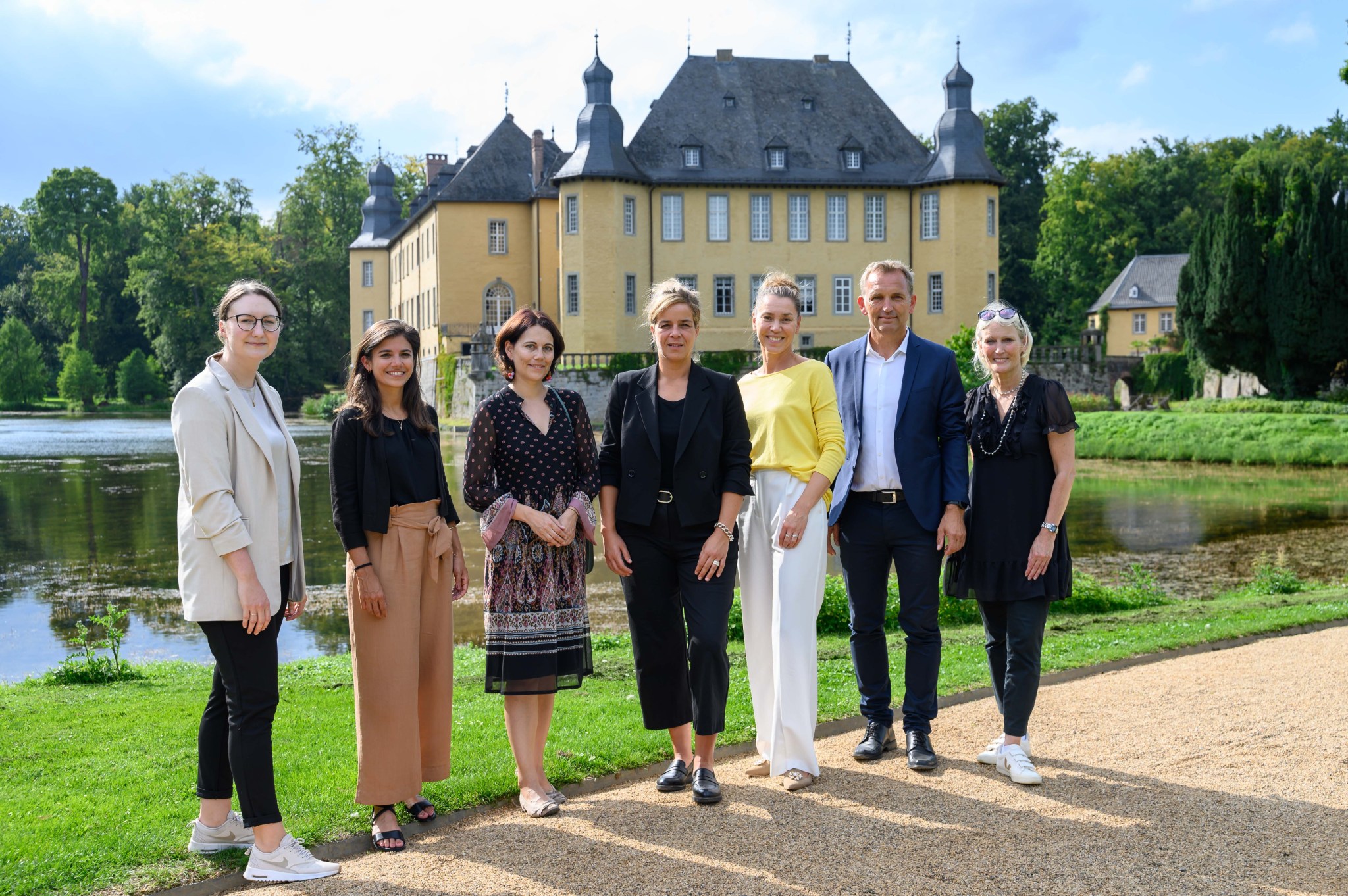Since 2022, Mona Neubaur has been the Minister of Economic Affairs, Climate Protection, Energy, and Industry of North Rhine-Westphalia, making her one of the most influential figures in German politics today.
Editor's Notes: Mona Neubaur: German Politician And Minister Of Economic Affairs, Climate Protection, Energy, And Industry has published today investigating the importance of her work in shaping Germany's economic and energy policies.
After analyzing information and gathering insights, this article will provide a comprehensive overview of Mona Neubaur's career and her role in shaping Germany's economic and energy policies.
FAQ
This page provides answers to frequently asked questions regarding the work and policies of Mona Neubaur, Minister of Economic Affairs, Climate Protection, Energy, and Industry in Germany.

NRW-Ministerin Mona Neubaur besucht Familienfest von thyssenkrupp - Source www.pressebox.de
Question 1: What are Mona Neubaur's key priorities as Minister?
Mona Neubaur's primary objectives include accelerating the transition to renewable energy, promoting climate protection measures, and fostering economic development within the state of North Rhine-Westphalia.
Question 2: What are the specific actions being taken to address climate change?
Neubaur's strategy focuses on expanding solar and wind power capacity, phasing out coal-fired power plants, and enhancing energy efficiency in buildings and transportation.
Question 3: How is the Ministry supporting businesses during the transition to a green economy?
The Ministry provides funding and incentives to businesses investing in renewable energy technologies, energy-saving measures, and sustainable practices.
Question 4: What role does the Ministry play in promoting innovation and research?
The Ministry supports research and development projects aimed at advancing renewable energy technologies, energy storage solutions, and digitalization in the energy sector.
Question 5: How can the public participate in the Ministry's decision-making processes?
The Ministry conducts public consultations, workshops, and stakeholder meetings to gather input and feedback from citizens and industry representatives.
Question 6: What are the key challenges facing the Ministry in the coming years?
The Ministry will continue to face challenges in balancing the need for economic growth with climate protection goals, ensuring a reliable and affordable energy supply, and addressing the social implications of the energy transition.
These questions and answers provide a comprehensive overview of the work and priorities of Mona Neubaur as Minister of Economic Affairs, Climate Protection, Energy, and Industry in Germany.
Refer to the official website of the Ministry for additional information.
Tips by Mona Neubaur: German Politician And Minister Of Economic Affairs, Climate Protection, Energy, And Industry

Besuch Mona Neubaur - Source innovation-hub.de
Mona Neubaur, German Politician And Minister Of Economic Affairs, Climate Protection, Energy, And Industry
Tip 1: Embracing Sustainability in Business Practices: Integrate sustainability into all aspects of business operations, including supply chain management, production processes, and waste reduction.
Benefits: Enhances reputation, attracts environmentally conscious consumers, and reduces operating costs.
Tip 2: Investing in Renewable Energy: Transition to renewable sources such as solar, wind, and geothermal for electricity generation. Encourage the development of green technologies and infrastructure.
Benefits: Reduces carbon footprint, promotes energy independence, and supports job creation in the clean energy sector.
Tip 3: Promoting Energy Efficiency: Implement measures to reduce energy consumption in buildings, industries, and transportation. Encourage the adoption of energy-efficient appliances, insulation, and renewable heating systems.
Benefits: Lowers energy bills, conserves resources, and contributes to emission reductions.
Tip 4: Fostering Climate Education: Engage with stakeholders, including businesses, schools, and communities, to raise awareness about climate change and its impacts. Promote climate literacy and encourage responsible decision-making.
Benefits: Empowers individuals and organizations to take meaningful climate action, fosters a sense of urgency, and builds a foundation for long-term climate mitigation.
Tip 5: Supporting Sustainable Urban Planning: Prioritize green infrastructure, such as parks, bike lanes, and green roofs, in urban development. Integrate sustainable transportation options, including public transportation, walking, and cycling.
Benefits: Improves air quality, reduces urban heat island effect, and promotes healthy lifestyles.
Tip 6: Enhancing Ecosystem Services: Protect and restore natural ecosystems, such as forests, wetlands, and grasslands. Implement nature-based solutions for climate adaptation and mitigation, such as tree planting and wetland restoration.
Benefits: Sequesters carbon, regulates water flow, provides habitat for biodiversity, and supports sustainable agriculture.
Tip 7: Fostering Climate Resiliency: Assess climate risks and develop adaptation strategies for vulnerable regions. Implement measures to strengthen infrastructure, protect coastal areas, and enhance disaster preparedness.
Benefits: Minimizes climate-related economic losses, ensures societal well-being, and safeguards critical infrastructure.
Tip 8: Supporting Climate Research: Invest in scientific research to deepen our understanding of climate change, its impacts, and potential solutions.
Benefits: Improves climate modeling, informs policy decisions, and supports the development of innovative technologies for climate mitigation and adaptation.
Summary: By embracing these tips, businesses, governments, and individuals can contribute to a sustainable future and mitigate the effects of climate change. These actions not only protect the environment but also drive economic growth, improve public health, and enhance societal well-being.
Mona Neubaur: German Politician And Minister Of Economic Affairs, Climate Protection, Energy, And Industry
Mona Neubaur, a member of the Green Party, is a German politician who has held various ministerial positions in the state of North Rhine-Westphalia. Her roles have focused on energy, climate, and economic affairs, making her a prominent figure in these domains.
- Political Affiliation: Green Party Member
- Ministerial Role: Economic Affairs, Climate Protection, Energy, and Industry
- Focus Areas: Climate Policy, Energy Transition, Sustainable Development
- Notable Achievements: Climate Protection Law for North Rhine-Westphalia
- Advocacy: Renewable Energy Expansion, Coal Phase-Out
- International Collaborations: Climate Diplomacy and Exchange
Mona Neubaur's influence extends beyond Germany through her participation in international climate initiatives and the exchange of best practices. Her strong advocacy for renewable energy and the phasing out of fossil fuels has played a significant role in shaping North Rhine-Westphalia's energy policy. As a key figure in the transition to a more sustainable and climate-friendly future, Neubaur's work serves as an example of the growing importance of these issues in the political and economic landscape.

Mona Neubaur im Dialog mit Einzelhändlern in Viersen - Source rp-online.de

NRW-Wirtschaftsministerin Neubaur zu Gast bei KI.NRW - Source www.ki.nrw
Mona Neubaur: German Politician And Minister Of Economic Affairs, Climate Protection, Energy, And Industry
Mona Neubaur is a German politician who has served as Minister of Economic Affairs, Climate Protection, Energy, and Industry of North Rhine-Westphalia since 2022. A member of the Green Party, she has been a member of the Landtag of North Rhine-Westphalia since 2010.

Ministerin Neubaur zu Besuch auf Schloss Dyck - Source news.airbnb.com
Neubaur's portfolio includes a wide range of responsibilities related to economic development, climate protection, energy policy, and industrial policy. She is a strong advocate for renewable energy and has been a leading voice in the call for a transition to a sustainable, low-carbon economy. Neubaur has also been a vocal critic of the coal industry and has called for an end to coal mining in North Rhine-Westphalia.
Neubaur's work in the areas of economic development, climate protection, energy policy, and industrial policy is vital to the future of North Rhine-Westphalia. By promoting sustainable economic growth, protecting the environment, and ensuring a reliable and affordable energy supply, Neubaur is helping to create a more prosperous and sustainable future for the state.
| Name | Title | Responsibilities |
|---|---|---|
| Mona Neubaur | Minister of Economic Affairs, Climate Protection, Energy, and Industry of North Rhine-Westphalia | - Economic development - Climate protection - Energy policy - Industrial policy |
Conclusion
Mona Neubaur is a key figure in the German Green Party and a leading voice in the fight against climate change. She is a strong advocate for renewable energy and has been a vocal critic of the coal industry. Neubaur's work in the areas of economic development, climate protection, energy policy, and industrial policy is vital to the future of North Rhine-Westphalia. By promoting sustainable economic growth, protecting the environment, and ensuring a reliable and affordable energy supply, Neubaur is helping to create a more prosperous and sustainable future for the state.
Neubaur's commitment to sustainability and her dedication to fighting climate change are inspiring. She is a role model for other politicians and activists who are working to create a more just and sustainable world.
